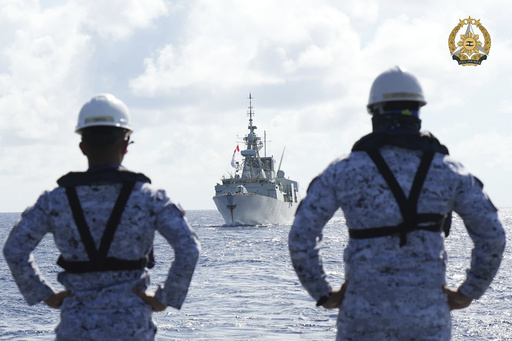
MANILA, Philippines — Negotiations for a significant defense agreement between Canada and the Philippines have reached an advanced stage, allowing their military forces to conduct more extensive joint exercises, according to the Canadian ambassador to the Philippines. Concerns have also been raised regarding China’s “provocative and unlawful actions” in the region.
Canada is bolstering its military presence in the Indo-Pacific area and is committed to promoting international law and enhancing trade and investment. This initiative aligns with the objectives of the Philippine government, under President Ferdinand Marcos Jr., to strengthen defense relationships with allied nations in response to an increasingly assertive China asserting its claims in the contested waters.
Ambassador David Hartman mentioned during a recent event that Canada and the Philippines are nearing completion of a “status of forces visiting agreement,” which would facilitate more comprehensive participation in joint training processes and operations with the Philippines and other allies in the region.
Hartman made his remarks while addressing Philippine security personnel, foreign ambassadors, and defense attaches aboard the HMCS Ottawa, a Halifax-class frigate from the Royal Canadian Navy, currently docked in Manila. This vessel is scheduled to participate in a joint exercise off the Philippine coast next week.
The Philippine military has been conducting multinational patrols and exercises since last year with forces from the United States, Japan, France, Australia, and Canada, which have provoked irritation from China.
China claims almost the entire South China Sea, a crucial global maritime route, and has deployed its coast guard and naval assets to protect what it asserts is its territory. In contrast, the Philippines, Vietnam, Malaysia, Brunei, and Taiwan have claims that conflict with those of China, leading to heightened territorial disputes, particularly between Beijing and Manila in the past two years.
In August of the previous year, Canada participated in air and naval exercises alongside the U.S., Australia, and the Philippines to uphold the rule of law and ensure unimpeded navigation in the South China Sea. In response, China conducted its own air and maritime patrols on the same day; although no direct confrontations were reported, the Philippine military noted that three Chinese naval vessels monitored the cooperative maneuvers executed by the four-nation coalition along the western coastline of the Philippines.
Ambassador Hartman emphasized Canada’s commitment to confronting “provocative and unlawful actions” by China in these contested waters, reiterating, “We will continue to do so.” In the previous year, Canada formalized a defense cooperation agreement with the Philippines. Additionally, another agreement signed in Ottawa in 2023 allowed the Philippines access to Canada’s advanced “Dark Vessel Detection System,” which utilizes satellite technology to track illegal vessels even if they deactivate their location-tracking devices.
The Philippine coast guard has accused Chinese ships, both coast guard and fishing vessels, of turning off their transponder devices to evade detection and scrutiny in the South China Sea. Currently, the Philippines maintains visiting forces agreements only with the United States and Australia, which provide a legal basis for temporary deployments of foreign military personnel and large-scale combat drills. In July of last year, a similar agreement was signed with Japan, although it awaits ratification by the Japanese parliament.
Furthermore, the Philippines is engaged in separate discussions regarding defense agreements with France and New Zealand to further strengthen its military alliances.

